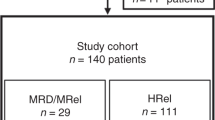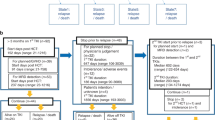Abstract
Relapse is a major cause of treatment failure in Philadelphia-chromosome-positive acute lymphoblastic leukemia (Ph+ALL) undergoing allogeneic hematopoietic cell transplantation (allo-HCT). This study aimed to evaluate the effect of a new pre-emptive tyrosine kinase inhibitors (TKIs) strategy on relapse in Ph+ALL patients with complete remission undergoing allo-HCT. Pre-emptive TKIs initiation was based on BCR/ABL molecular monitoring. TKIs choice was based on BCR/ABL mutations. Donor lymphocyte infusion was recommended in those with poor response to TKIs. Prophylactic TKIs from historical data were as control. The primary endpoint was relapse. One hundred and sixty-seven Ph+ALL patients were enrolled in this study, including 103 in the pre-emptive group and 64 in the prophylactic group. The 3-year cumulative incidence of relapse was 11% and 31% in the pre-emptive and prophylactic groups (P = 0.001), respectively. The 3-year overall survival (OS) was 87% and 66% (P = 0.001), and leukemia-free survival (LFS) was 83% and 61% (P = 0.000), respectively, in the pre-emptive and prophylactic groups. Multivariate analysis showed that the pre-emptive strategy was the protective factor for relapse, OS, and LFS (P = 0.005, P = 0.005, and P = 0.003, respectively). Our data suggest that this new pre-emptive TKIs strategy based on BCR/ABL molecular monitoring might reduce relapse and improve survival for Ph+ALL patients undergoing allo-HCT. ClinicalTrials.Gov Identifier (NCT01883219).
This is a preview of subscription content, access via your institution
Access options
Subscribe to this journal
Receive 12 print issues and online access
$259.00 per year
only $21.58 per issue
Buy this article
- Purchase on Springer Link
- Instant access to full article PDF
Prices may be subject to local taxes which are calculated during checkout



Similar content being viewed by others
References
Wassmann B, Pfeifer H, Goekbuget N, Beelen DW, Beck J, Stelljes M, et al. Alternating versus concurrent schedules of imatinib and chemotherapy as front-line therapy for Philadelphia-positive acute lymphoblastic leukemia (Ph1 ALL). Blood. 2006;108:1469–77.
Mizuta S, Matsuo K, Yagasaki F, Yujiri T, Hatta Y, Kimura Y, et al. Pre-transplant imatinib- based therapy improves the outcome of allogeneic hematopoietic stem cell transplantation for BCR/ABL positive acute lymphoblastic leukemia. Leukemia. 2011;25:41–7.
Soverini S, Bassan R, Lion T. Treatment and monitoring of Philadelphia chromosome-positive leukemia patients: recent advances and remaining challenges. J Hematol Oncol. 2019;12:39.
Gao L, Zhang C, Gao L, Liu Y, Su Y, Wang S, et al. Favorable outcome of haploidentical hematopoietic stem cell transplantation in Philadelphia chromosome-positive acute lymphoblastic leukemia: a multicenter study in Southwest China. J Hematol Oncol. 2015;8:90.
Chalandon Y, Thomas X, Hayette S, Cayuela JM, Abbal C, Huguet F, et al. Randomized study of reduced-intensity chemotherapy combined with imatinib in adults with Ph-positive acute lymphoblastic leukemia. Blood. 2015;125:3711–9.
Giebel S, Czyz A, Ottmann O, Baron F, Brissot E, Ciceri F, et al. Use of tyrosine kinase inhibitors to prevent relapse after allogeneic hematopoietic stem cell transplantation for patients with Philadelphia chromosome-positive acute lymphoblastic leukemia: a position statement of the Acute Leukemia Working Party of the European Society for Blood and Marrow Transplantation. Cancer. 2016;122:2941–51.
Zhu YM, Wu Z, Tan YP, Du YY, Liu Z, Ou RM, et al. Anti-CD19 chimeric antigen receptor T-cell therapy for adult Philadelphia chromosome-positive acute lymphoblastic leukemia: two case reports. Medicine. 2016;95:e5676.
Zhang LN, Song Y, Liu D. CD19 CAR-T cell therapy for relapsed/refractory acute lymphoblastic leukemia: factors affecting toxicities and long-term efficacies. J Hematol Oncol. 2018;11:41.
Yoshimitsu M, Fujiwara H, Ozaki A, Hamada H, Matsushita K, Arima N, et al. Case of a patient with Philadelphia-chromosome-positive acute lymphoblastic leukemia relapsed after myeloablative allogeneic hematopoietic stem cell transplantation treated successfully with imatinib and sequential donor lymphocyte infusions. Int J Hematol. 2008;88:331–5.
Chen H, Liu KY, Xu LP, Chen YH, Han W, Zhang XH, et al. Haploidentical hematopoietic stem cell transplantation without in vitro T cell depletion for the treatment of philadelphia chromosome-positive acute lymphoblastic leukemia. Biol Blood Marrow Transpl. 2015;21:1110–6.
Caocci G, Vacca A, Ledda A, Murgia F, Piras E, Greco M, et al. Prophylactic and preemptive therapy with dasatinib after hematopoietic stem cell transplantation for Philadelphia chromosome-positive acute lymphoblastic leukemia. Biol Blood Marrow Transpl. 2012;18:652–4.
Chen H, Liu KY, Xu LP, Liu DH, Chen YH, Zhao XY, et al. Administration of imatinib after allogeneic hematopoietic stem cell transplantation may improve disease-free survival for patients with Philadelphia chromosome-positive acute lymphoblastic leukemia. J Hematol Oncol. 2012;5:29.
Shimoni A, Volchek Y, Koren-Michowitz M, Varda-Bloom N, Somech R, Shem-Tov N, et al. Phase 1/2 study of nilotinib prophylaxis after allogeneic stem cell transplantation in patients with advanced chronic myeloid leukemia or Philadelphia chromosome-positive acute lymphoblastic leukemia. Cancer. 2015;121:863–71.
Brissot E, Labopin M, Beckers MM, Socié G, Rambaldi A, Volin L, et al. Tyrosine kinase inhibitors improve long-term outcome of allogeneic hematopoietic stem cell transplantation for adult patients with Philadelphia chromosome positive acute lymphoblastic leukemia. Haematologica. 2015;100:392–9.
Warraich Z, Tenneti P, Thai T, Hubben A, Amin H, McBride A, et al. Relapse prevention with tyrosine kinase inhibitors after allogeneic transplantation for Philadelphia chromosome-positive acute lymphoblast leukemia: a systematic review. Biol Blood Marrow Transpl. 2020;26:e55–64.
Nishiwaki S, Imai K, Mizuta S, Kanamori H, Ohashi K, Fukuda T, et al. Impact of MRD and TKI on allogeneic hematopoietic cell transplantation for Ph+ALL: a study from the adult ALL WG of the JSHCT. Bone Marrow Transpl. 2016;51:43–50.
Zhang FH, Ling YW, Zhai X, Zhang Y, Huang F, Fan ZP, et al. The effect of imatinib therapy on the outcome of allogeneic stem cell transplantation in adults with Philadelphia chromosome-positive acute lymphoblastic leukemia. Hematology. 2013;18:151–7.
Liew Elena, Ghosh Sunita, Saini Lalit. Use of tyrosine kinase inhibitors post-allogeneic stem cell transplant in patients with Philadelphia or BCR/ABL positive acute lymphoblastic leukemia: a systematic review and meta-analysis. Blood. 2016;128:2778.
Pfeifer H, Wassmann B, Bethge W, Dengler J, Bornhäuser M, Stadler M, et al. Randomized comparison of prophylactic and minimal residual disease-triggered imatinib after allogeneic stem cell transplantation for BCR-ABL1 positive acute lymphoblastic leukemia. Leukemia. 2013;27:1254–62.
Wassmann B, Pfeifer H, Stadler M, et al. Early molecular response to posttransplantation imatinib determines outcome in MRD1 Philadelphia-positive acute lymphoblastic leukemia (Ph1 ALL). Blood. 2005;106:458–63.
Harris NL, Jaffe ES, Diebold J, Flandrin G, Muller-Hermelink HK, Vardiman J, et al. The World Health Organization classification of neoplastic diseases of the haematopoietic and lymphoid tissues: report of the Clinical Advisory Committee Meeting, Airlie House, Virginia, November 1997. Histopathology. 2000;36:69–86.
Xuan L, Fan Z, Zhang Y, Zhou H, Huang F, Dai M, et al. Sequential intensified conditioning followed by prophylactic DLI could reduce relapse of refractory acute leukemia after allo-HSCT. Oncotarget. 2016;7:32579–91.
O’Brien S, Berman E, Borghaei H, Deangelo DJ, Devetten MP, Devine S, et al. National Comprehensive Cancer Network. NCCN clinical practice guidelines in oncology: chronic myelogenous leukemia. J Natl Compr Canc Netw. 2009;7:984–1023.
O’Brien S, Radich JP, Abboud CN, Akhtari M, Altman JK, Berman E, et al. Chronic myelogenous leukemia, version 1.2015. J Natl Compr Canc Netw. 2014;12:1590–610.
Yu G, Chen F, Yin C, Liu Q, Sun J, Xuan L, et al. Upfront treatment with the first and second-generation tyrosine kinase inhibitors in Ph-positive acute lymphoblastic leukemia. Oncotarget. 2017;8:107022–32.
Fan Q, Liu H, Liang X, Yang T, Fan Z, Huang F, et al. Superior GVHD-free, relapse-free survival for G-BM to G-PBSC grafts is associated with higher MDSCs content in allografting for patients with acute leukemia. J Hematol Oncol. 2017;10:135.
Yu S, Huang F, Fan Z, Xuan L, Nie D, Xu Y, et al. Haploidentical versus HLA-matched sibling transplantation for refractory acute leukemia undergoing sequential intensified conditioning followed by DLI: an analysis from two prospective data. J Hematol Oncol. 2020;13:18.
Przepiorka D, Weisdorf D, Martin P, Klingemann HG, Beatty P, Hows J, et al. 1994 Consensus conference on acute GVHD grading. Bone Marrow Transpl. 1995;15:825–8.
Horwitz ME, Sullivan KM. Chronic graft-versus-host disease. Blood Rev. 2006;20:15–27.
Pfeifer H, Lange T, Wystub S, Wassmann B, Maier J, Binckebanck A, et al. Prevalence and dynamics of BCR/ABL kinase domain mutations during imatinib treatment differ in patients with newly diagnosed and recurrent BCR/ABL positive acute lymphoblastic leukemia. Leukemia. 2012;26:1475–81.
Jones D, Thomas D, Yin CC, O’Brien S, Cortes JE, Jabbour E, et al. Kinase domain point mutations in Philadelphia chromosome-positive acute lymphoblastic leukemia emerge after therapy with BCR/ABL kinase inhibitors. Cancer. 2008;113:985–94.
Kast RE, Focosi D. Three paths to better tyrosine kinase inhibition behind the blood-brain barrier in treating chronic myelogenous leukemia and glioblastoma with imatinib. Transl Oncol. 2010;3:13–5.
Savani BN, Srinivasan R, Espinoza-Delgado I, Dorrance C, Takahashi Y, Igarashi T, et al. Treatment of relapsed blast-phase Philadelphia-chromosome-positive leukemia after non- myeloablative stem-cell transplantation with donor lymphocytes and imatinib. Lancet Oncol. 2005;6:809–12.
Tiribelli M, Sperotto A, Candoni A, Simeone E, Buttignol S, Fanin R. Nilotinib and donor lymphocyte infusion in the treatment of Philadelphia-positive acute lymphoblastic leukemia (Ph+ ALL) relapsing after allogeneic stem cell transplantation and resistant to imatinib. Leuk Res. 2009;33:174–7.
Acknowledgements
We thank Pro. Robert Gale (Haematology Research Centre, Division of Experimental Medicine, Department of Medicine, Imperial College, London, UK) and Pro. Michael Andreeff (Section of Molecular Hematology and Therapy, Department of Leukemia, The University of Texas MD Anderson Cancer Center, Houston, TX, USA) for offering expert advice. We thank all the faculty members that participated in these studies. This work was supported by the National Key Research and Development Programme of China (Grant Nos. 2017YFA105500, 2017YFA105504), the National Natural Science Foundation of China (Nos. 81770190, 81700176, 81500149, 81401315), Science and Technology Planning Project of Guangdong Province (2019B020236004), Project of the Zhujiang Science and Technology Star of Guangzhou City (No. 201806010029), Natural Science Foundation of Guangdong Province (No. 2019A1515011924), the Science and Technology Program of Guangzhou City (201707010213), and the Clinical Research Project of Nanfang Hospital, Southern Medical University (LC2016ZD009).
Author information
Authors and Affiliations
Corresponding authors
Ethics declarations
Conflict of interest
The authors declare that they have no conflict of interest.
Additional information
Publisher’s note Springer Nature remains neutral with regard to jurisdictional claims in published maps and institutional affiliations.
Rights and permissions
About this article
Cite this article
Liu, H., Xuan, L., Lin, R. et al. A new pre-emptive TKIs strategy for preventing relapse based on BCR/ABL monitoring for Ph+ALL undergoing allo-HCT: a prospective clinical cohort study. Leukemia 35, 2054–2063 (2021). https://doi.org/10.1038/s41375-020-01090-4
Received:
Revised:
Accepted:
Published:
Issue Date:
DOI: https://doi.org/10.1038/s41375-020-01090-4
This article is cited by
-
A pilot study of implication of machine learning for relapse prediction after allogeneic stem cell transplantation in adults with Ph-positive acute lymphoblastic leukemia
Scientific Reports (2023)
-
Prophylactic or preemptive tyrosine kinase inhibitor therapy after allogeneic hematopoietic cell transplantation for Philadelphia chromosome-positive acute lymphoblastic leukemia
International Journal of Hematology (2023)
-
Effect of pediatric- versus adult-type chemotherapy regimens on outcomes of allogeneic hematopoietic stem cell transplants for adult T-cell acute lymphoblastic leukemia in first complete remission
Bone Marrow Transplantation (2022)



